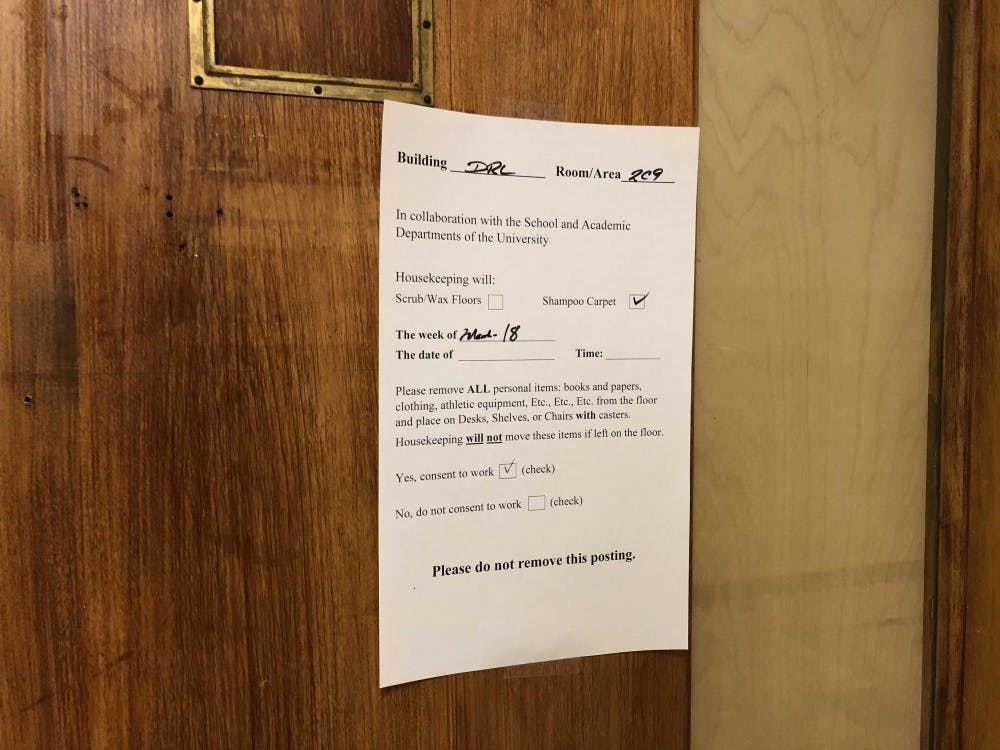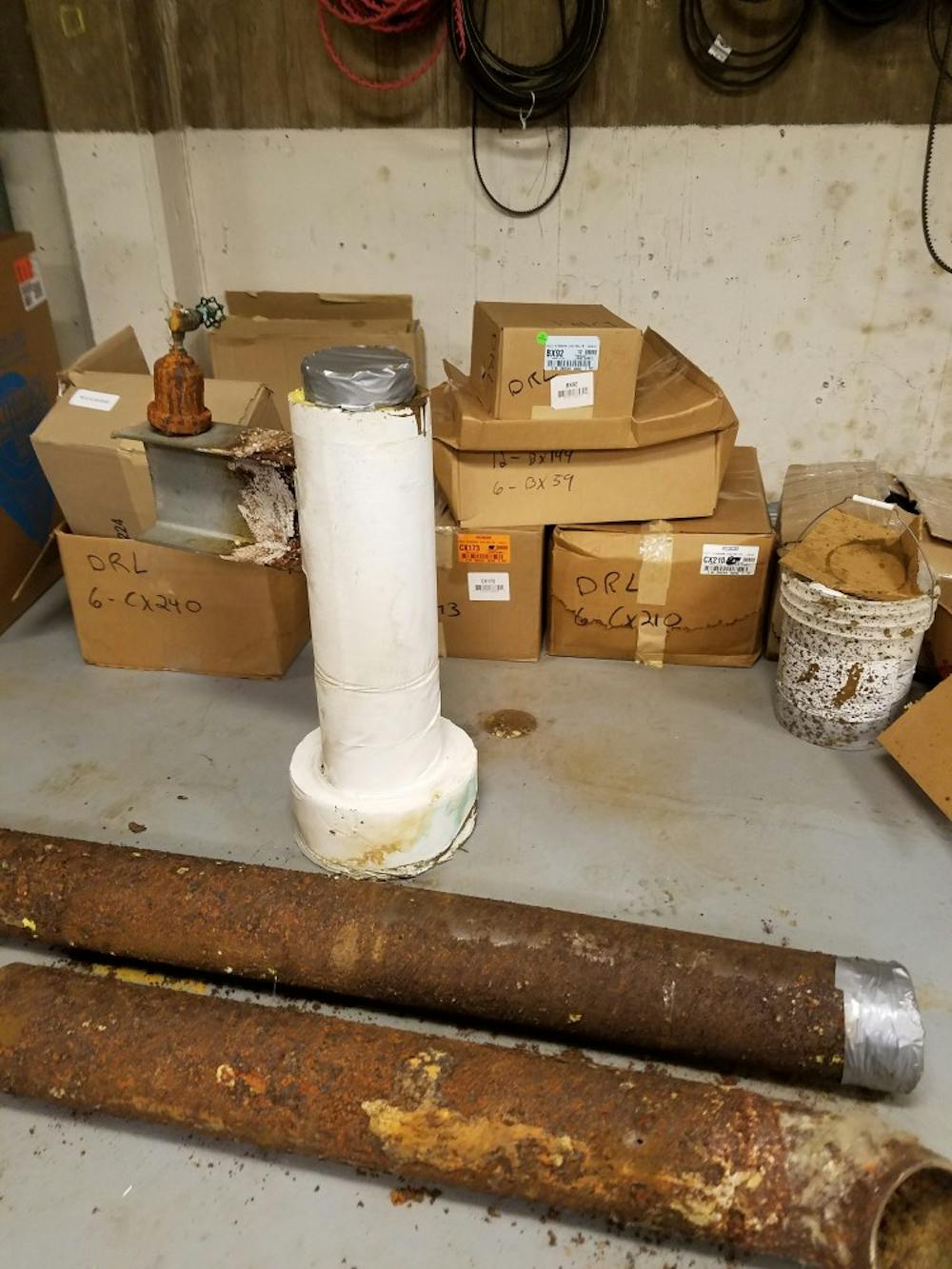
The petition posted in David Rittenhouse Laboratory requests improvement on the recurring maintenance issues.
Credit: Daniel WangAfter a petition surfaced calling on administrators to improve the recurring maintenance issues in David Rittenhouse Laboratory, the University took steps to address the building's poor working conditions. Despite the progress, students do not think these actions will fix the long-term issues they continue to face.
Graduate students sent administrators a petition on Feb. 27 demanding Penn to solve the frequent ceiling leakages and pest infestations in DRL. The petition, which was signed by more than 150 students, faculty, and staff, was sparked by a major ceiling leak last month, which forced 10 graduate students to relocate out of their offices and resulted in damage to 18 rooms. The leak was caused by several abandoned pipes in DRL's cooling system, which are filled with pressurized chilled water that caused them to burst.

The frozen pipes that were causing flooding were removed by Facilities and Real Estate Services. (Photo from Mariana Carrillo Gonzalez)
Since the petition was sent, Facilities and Real Estate Services removed the frozen pipes that caused the flooding on March 2 to prevent future leaks.
FRES also contacted the entomologist who surveyed the building in April 2017 to request that they do another analysis of pest control in the building. There will be a "multi-year and multi-phase effort" to update the heating, ventilation, and air conditioning system in DRL, with some renovations currently underway, Faramarz Vakilizadeh, executive director of FRES Operations & Maintenance, wrote in an email to The Daily Pennsylvanian.
Facilities also began doing restorative cleaning on the public areas of DRL, which involves stripping, scrubbing, and waxing hard surfaces and deep cleaning carpets.
Fourth-year physics Ph.D. student Mariana Carrillo Gonzalez, helped write the petition, said she and her fellow petition writers are "generally satisfied with the response," but they remain concerned that there is no short-term solution for the temperature control problem, which will only take effect after they graduate. She also added that the long-term temperature plans for renovating the heating, ventilation, and air conditioning system were "vague."
Fourth-year physics Ph.D. student and petition writer Lucas Secco said that plans to improve pest control were also unclear. He mentioned that although the administration said they would get in touch with the entomologist and send the petition writers updates, the grad students have not received any updates almost three weeks after they sent the letter. Third-year physics Ph.D. student Guram Kartvelishvili, who also helped draft the petition, said pest problems remained even though Penn implemented recommendations from the last analysis conducted by the same entomologist.
Physics professor Gene Mele, whose office was flooded in the recent pipe burst, said he remained in his office until March 15, when the replacing of ceiling tiles and carpeting forced him to relocate to another office.
"I got an email here at home saying you ought to come in here, there's a leak, the door is open, you might want to salvage some stuff," Mele said. "When I got in, it was literally raining from the ceiling in my office. There were a number of things that were disposed of."
Mele said he appreciated the short-term emergency response, but the continuous maintenance problems are still an issue.
Fourth-year physics Ph.D. student Anushrut Sharma, who was an author of the petition, said the poor temperature regulation in their offices have also affected their health, leading them to develop colds. Sharma said he measured the humidity levels in his office and found it to be 10 to 15 percent, although normal levels are 30 to 50 percent.
College senior Ali Ghorashi said the short-term response to the petition was adequate, and that there is not much damage left in areas the undergraduate students frequently use, like the Math/Physics/Astronomy Library.
"I think we have to stress long term fixing of DRL, because these sorts of issues recur and then they’re always fixed temporarily, but I think the real test will be if these sorts of repairs last long term," Ghorashi said.
Even with the long-term solutions in place, students and faculty said the building is still broken down and should be completely rebuilt.
Gonzalez said although she wants DRL to be renovated, she understands the logistics could be expensive and complicated because labs would have to be relocated. College senior Abigail Lee also said she thinks the best fix is for DRL "to be torn down and rebuilt."

There was concern that the damages might have impacted the prospective physics graduate student Visit Day, which took place earlier this week. (Photo from Mariana Carrillo Gonzalez)
Physics graduate group chair and professor Joshua Klein said an architect was commissioned in 2013 to provide a plan and estimated cost of completely renovating the building. The option was not pursued, however, due to budget constraints.
The petition writers and professors were worried the flooding damage would impact the prospective physics graduate student Visit Day, which took place on March 11. Despite facilities working to remove the frozen pipes and start restorative cleaning before Visit Day, prospective students still mentioned the poor building conditions during their visit.
Klein said prospective students brought up the building conditions on Visit Day, but said he told them that was not a highlight of the physics program.
"I can’t say that any one student is going to say I’m not coming to your program because the building is ugly," Klein said, "But it does set a tone — if you walk around the building and it looks like an unattractive place to work, other things don’t necessarily look so good either."
Mele, who serves on the graduate admissions committee, said he spoke to Klein suggesting that Visit Day should be canceled so the prospective graduate students would not see the remnants of the flooding in DRL.
“This is not only trying to recruit good graduate students, but we’re also recruiting faculty," Mele said. "We really want to have a functional and comfortable working environment to attract them. I visit many universities to give talks and seminars and I would say that in my travels I’ve seen a few that are nearly as bad as what we’ve got here, but I haven’t seen any that are worse.”
The Daily Pennsylvanian is an independent, student-run newspaper. Please consider making a donation to support the coverage that shapes the University. Your generosity ensures a future of strong journalism at Penn.
Donate







